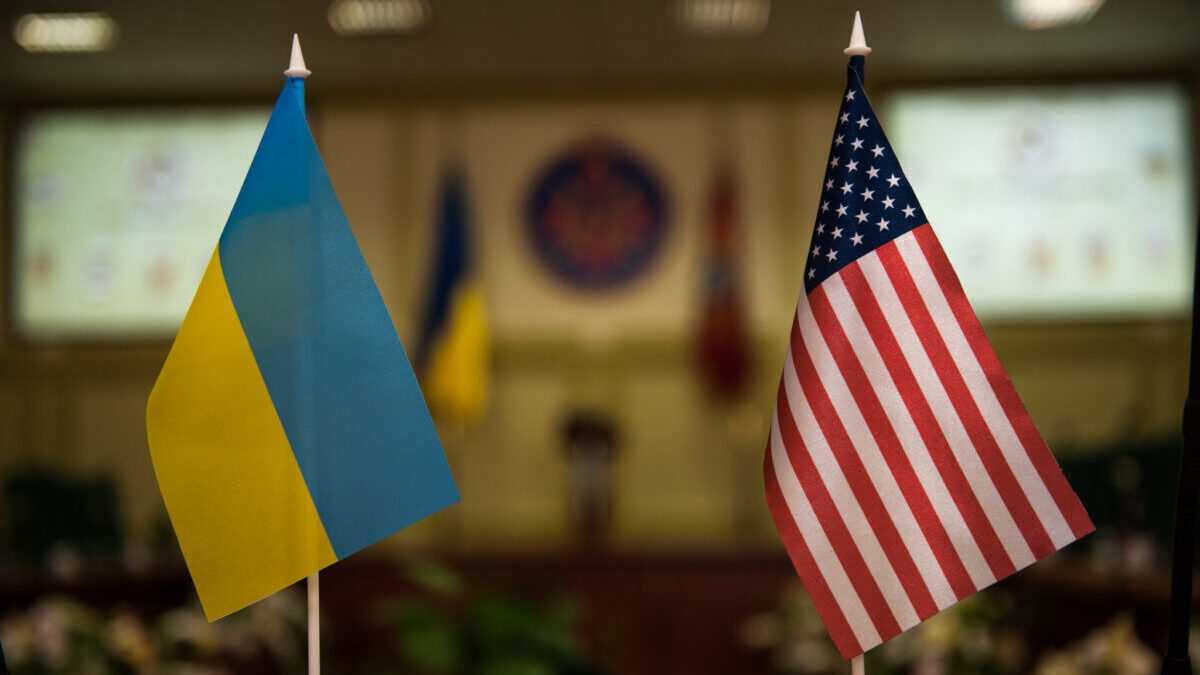Enjoying a walk with my wife on a comfortable fall day in the Pittsburgh suburbs, I noticed the village activist’s house in the wealthy neighborhood where we happened to find ourselves. Sitting among a sea of homes with Democratic yard signs, this house aimed a level or two higher. A rainbow was painted on the red-brick exterior. Every important Democratic candidate, from U.S. Senate to state senate, featured prominently. Black Lives Matter had its space, as did the blue-yellow equal sign. Other signs cited pollination-related reasons for the unkempt lawn. The home’s inhabitants believe in science and other things. And — drumroll — there was a Ukrainian flag. One of these isn’t like the others.
This isn’t an anomaly. A casual glance at social media sites will reveal an endless number of Ukrainian flags positioned next to rainbow flags and pronoun badges. As someone who has devoted much of his life to the study of Central and Eastern Europe, I find this all a bit odd. Why does the Ukrainian flag suddenly occupy a place among the fashionable leftist symbols of the moment?
The simple answer is the self-righteousness of our societal elites. For a variety of reasons, sporting a Ukrainian flag offers a reliable mode of virtue-signaling for even those who until recently knew little about the country.
On paper, a war in Ukraine seems an unlikely cause célèbre for the left. Its identity-obsession complex gains little from a people who are Slavic Orthodox Christians, and relatively devout at that. The laws and sociopolitical climate in Ukraine would never be confused for those prevailing in California, Massachusetts, or the Nordic countries. The country’s only numerically significant “diverse community” is… Russian.
Against Russia or War?
Distaste for Russia, then, might be a better way to look at it. Those who refuse to accept that Donald Trump fairly won the 2016 presidential election might hold a lingering hatred of Russia. This explanation might have some validity, but it can’t possibly be the only one, or even the most important. Ukraine, after all, was also linked to the former president in a political show trial. Furthermore, if this flag-waving were more about Russia than Ukraine, we likely would have observed the advent of some directly anti-Kremlin symbol rather than the Ukrainian symbols we do see.
Positions on U.S. involvement in the war also do not fall neatly along a partisan divide. Only 57 Republican congressmen and 11 Republican senators voted against the $40 billion military and economic aid package in May. Former Vice President Mike Pence called opponents of Ukraine military aid “apologists” for Putin. In a Twitter dispute with Elon Musk, Trump ally Sen. Lindsey Graham offered this particularly simplistic advice: “If you want peace in Ukraine — which we ALL do — simply demand Russian [sic] honor the boundaries they agreed to in 1994 and withdraw their forces.” If coastal elites are reacting to a perceived a sense of “Russia love” among Republicans, this isn’t grounded in facts.
Abhorrence to scenes of invasion and war also doesn’t provide a satisfactory explanation. The long war in Syria, in which Russia was also heavily involved, elicited no similar reaction in the United States. We’re unlikely to see a slew of Taiwanese flags if China follows through on its saber-rattling — bank on that. If this is a matter of particular sensitivity to a war in the global West, then something must have changed dramatically since the former Yugoslavia tore itself apart in the 1990s.
How Do Elites Explain It?
Since none of these obvious explanations are convincing, we might as well examine what societal elites themselves say on the topic. New York Times columnist David Brooks proposes the vague distinction of “liberal nationalism,” as opposed to “illiberal nationalism,” for which he cites Russian President Vladimir Putin and Donald Trump as examples. He writes, “Volodymyr Zelensky is a nationalist. He is fighting not just for democracy but also for Ukraine — Ukrainian culture, Ukrainian land, the Ukrainian people and tongue. The symbol of this war is the Ukrainian flag, a nationalist symbol.”
Brooks also notes the obvious irony of “many people in this country who are proud to wear the Ukrainian flag but wouldn’t be caught dead wearing an American flag because they fear it would mark them as reactionary, jingoistic, low class.” His platitudes about liberalism are unconvincing. Zelensky, hailed the “Churchill of our time,” is guilty of the same corruption, cronyism, and offshore ventures endemic among Ukrainian politicians. If his regime exemplifies the liberal form of nationalism, is the distinction even important?
A Flag of Self
Thus, I propose this explanation for the metamorphosis of the Ukrainian flag: Societal elites and their online foot soldiers must find a way to express their own self-importance and maintain a certain position in society. With Trump playing an increasingly diminished role in American political discourse, a vacuum has developed.
It’s a safe cause. Any reasonable person is opposed to Russia’s senseless war. Rhetorically, Trump can be tied to Putin, and Putin can be tied to Adolf Hitler, all with little risk of pushback or recourse to facts. Unlike China, Russia does not have the ability to exact crippling economic and supply-chain revenge on the United States. And unlike Syria or Taiwan, Ukraine offers a chance to export both war and liberal democracy, a temptation that often proves too great for modern America to resist. It all congeals to fill a Trump-sized self-righteousness vacuum.
A dash of Ukrainian nationalism is hardly the most concerning societal development in the United States today. If it results in greater knowledge of Ukraine and the wider region, that can only be a good thing. Yet, we should resist with all our might any flag-waving self-importance that results in an extension or expansion of a war that benefits precisely no one.









